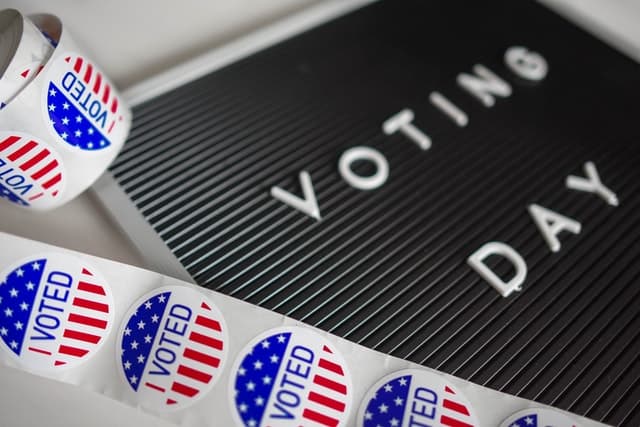
Have you been following the democratic primaries in the United States?
Do you hear people talking politics all the time in English?
We’re going to look at some of the words that people are likely using in conversation to talk about elections and politics in general.
There is a lot to understand, but if you can see some of the more common terms here you can be a part of the conversation.
You will understand the basics, and there is likely to be a lot more moving forward with the upcoming elections.
Get Your Transcripts Today!

Make sure you understand every word you hear on All Ears English.
Bring your English to the advanced level with new vocabulary and natural expressions.
Subscribe and get the transcripts delivered by email.
Learn to speak naturally with the American accent.
Click here to subscribe and save 50%
We have a great question about politics and some of the vocabulary that comes with this.
Hello Lindsay,
I just recently found your episodes and I’m so happy that I did. I would like to improve my English language as much as I can. I will be sure to keep listening to your episodes and stay in contact as much as possible.
Actually I have a question about something that I read in the news. I was reading and saw “Sen” before some of the names. I don’t really understand this, so would you tell me what the exact meaning of it is? I’m just looking for more context or an explanation of it.
Here’s what I read “More than four hours after the caucuses started with Sen. Bernie Sanders, Sen. Elizabeth Warren, former South Bend, Indiana, Mayor Pete Buttigieg and former Vice President Joe Biden vying for first place, the first results of 1,600 precincts have yet to emerge.”
Any help that you could provide would be much appreciated.
Thank you,
Bashair Saleh from K.S.A
Understanding A Bit of Background
This is an excellent question and so important at a time like this.
We discussed something similar on IELTS that is worth checking out.
If you go to this episode it can give you some great background: Band 9 Vocabulary List For Government Answers
We’re going to take this background, but put an AEE twist on it for you.
So what does Sen stand for?
It stands for Senator and this is a very important government position, especially right now.
There is also some other important information that can help you here.
There is Congress–this is the group of legislators in the U.S.
There is the legislative branch of government, along with the executive and judicial branches.
There are Members of Congress, and there is a breakdown of the various elected officials.
Inside this umbrella are Senators, as well as Congresswomen and Congressmen.
To further break this down, here are some helpful things to know.
- Senators are members of the Senate, and Congresswomen and men are in the House of Representatives (referred to as just “the House”)
- In every state, there are two senators. As you can see, Bernie Sanders is a Senator (Vermont), and Elizabeth Warren is a Senator (Massachusetts). These are six year terms for Senators.
- The number of congresswomen and congressmen changes from state to state, depending on how many people are in that state. These are two year terms for a seat in Congress.
Having this background can help you a lot in understanding and being part of the conversation.
Other Important Words In This
There are other important words to keep in mind for the political conversation.
There words will likely come up often, and so you want to stay in tuned to what they mean.
- Mayor: This is the elected official who leads a town, city, or municipality. The mayor of NYC is Bill DeBlasio, andPete Buttigieg and Mike Bloomberg were also mayors.
- Caucus: This is a way of states to vote for their party’s nominee for President. It can be very complicated as nominees hope to earn delegates in this.
- Primary: This is the process to select who should run in an election. The most recent were the democratic party primaries.
- Campaign: This can be a noun or verb and you will hear it a lot in conversation. This is something you run to try to achieve a goal , in this sense for political purposes. Everyone that works for the campaign is working hard to get you elected.
- Left-wing/Democrat/Liberal: These are all various terms used for the left or the Democratic party. There are various extremes within both parties. This party however has a more liberal set of beliefs or rules overall.
- Right-wing/Republican/GOP (Grand Old Party)/Conservative: This is the other party so it’s the right, or the Republican party. There are various extremes here too, but overall these beliefs here tend to be more conservative. There are sometimes controversial beliefs within both parties about
There are sometimes controversial beliefs within both parties about taxes, abortion, gun control, and immigration.
These are some good basic terms that you will hear thrown around now that we have an election coming up.
Native speakers are often trying to understand how some of these things work. It’s often a work in progress.
Primaries are confusing and even caucuses can be confusing too.
There is sure to be a lot of discussion around this as the upcoming election is on Tuesday, November 3rd.
Now you have a basic understanding so you can be part of the conversation, and that’s really important right now.
Roleplay To Help
As with anything, a roleplay can be quite helpful to see how these words are used in conversation.
This is a roleplay using some of these words, so you can see how they flow in conversation.
Michelle: “Did you see how Senator Warren did last night during the debate?”
Lindsay: “I did. I wonder what will happen with the caucus next week.”
Michelle: “Yeah, this is a very competitive primary for sure.”
Lindsay: “The candidates are all running really tough campaigns. I wonder who the *nominee will be.”
Michelle: “Me too. I wonder if we will get someone really left wing or a more moderate democrat.”
Lindsay: “I wonder if a mayor will become president!”
Takeaway
This is a great start with important words that you will likely hear in conversation a lot.
Listen to the news and you will hear a lot of these words and phrases.
The news and the media in general are certainly talking quite a bit about politics and the upcoming elections.
You are bound to hear these words and other great examples and contexts.
Stay in tune with this and you are going to learn some helpful ways to talk about politics.
This is a topic discussed quite often these days, and now you can be part of the conversation and use this to make connections.
If you have any questions, please leave them below in the comments section.
We’ll get back to you as soon as we can.








